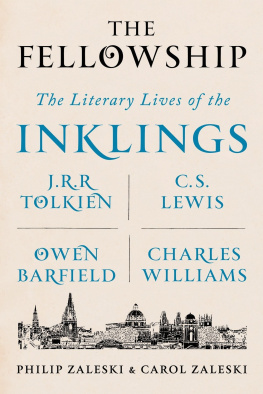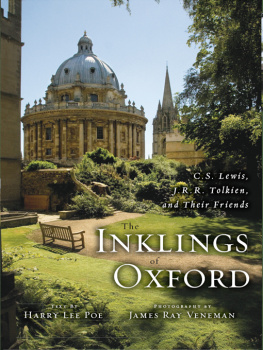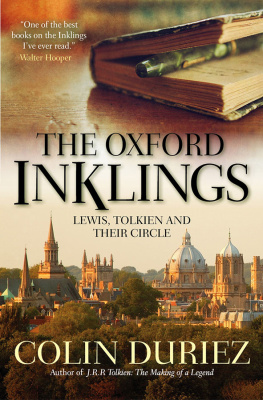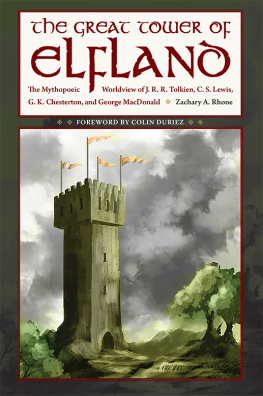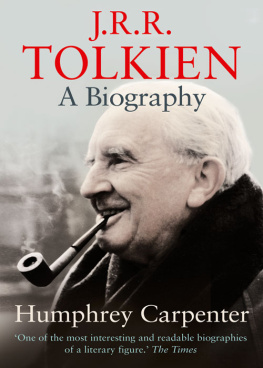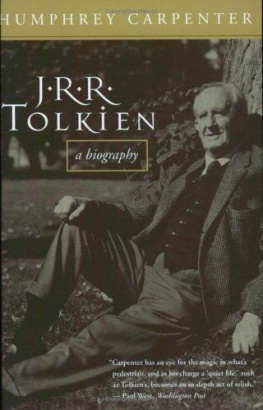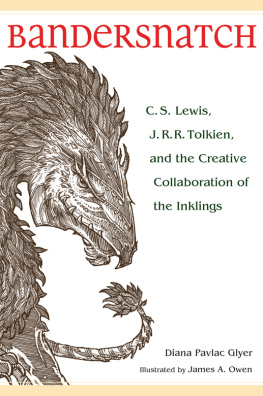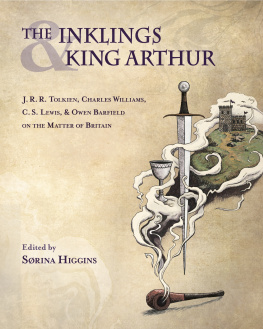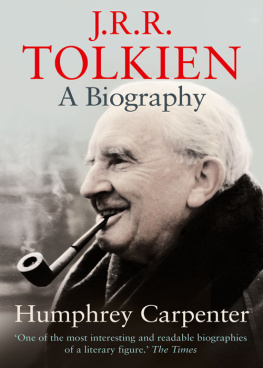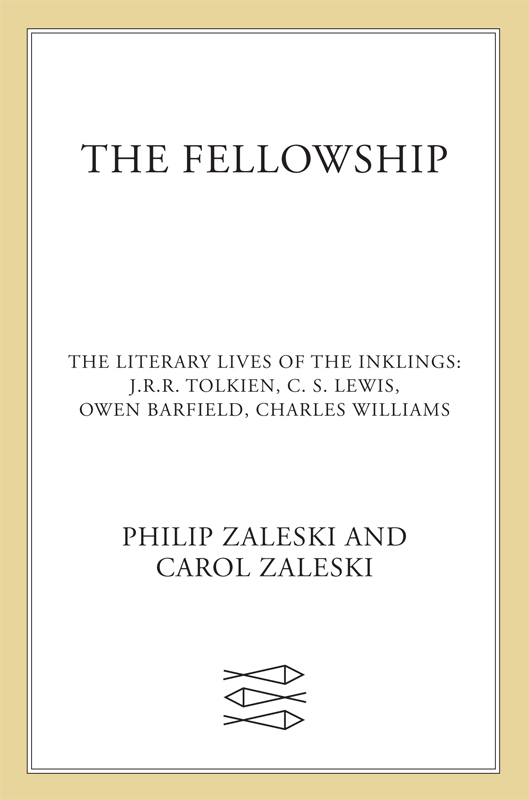Contents
Guide

The author and publisher have provided this e-book to you for your personal use only. You may not make this e-book publicly available in any way. Copyright infringement is against the law. If you believe the copy of this e-book you are reading infringes on the authors copyright, please notify the publisher at: us.macmillanusa.com/piracy.
To Lonie Caldecott and the memory of Stratford Caldecott (19532014)
nemo nisi per amicitiam cognoscitur
During the hectic middle decades of the twentieth century, from the end of the Great Depression through World War II and into the 1950s, a small circle of intellectuals gathered on a weekly basis in and around Oxford University to drink, smoke, quip, cavil, read aloud their works in progress, and endure or enjoy with as much grace as they could muster the sometimes blistering critiques that followed. This erudite club included writers and painters, philologists and physicians, historians and theologians, soldiers and actors. They called themselves, with typical self-effacing humor, the Inklings.
The novelist John Wain, a member of the group who achieved notoriety in midcentury as one of Englands angry young men, remembers the Inklings as a circle of instigators, almost of incendiaries, meeting to urge one another on in the task of redirecting the whole current of contemporary art and life. Yet the name Inklings, as J.R.R. Tolkien recalled it, was little more than a pleasantly ingenious pun suggesting people with vague or half-formed intimations and ideas plus those who dabble in ink. The donnish dreaminess thus hinted at tells us something important about this curious band: its members saw themselves as no more than a loose association of rumpled intellectuals, and this modest self-image is a large part of their charm. But history would record, however modest their pretensions, that their ideas did not remain half-formed nor their inkblots mere dabblings. Their polyvalent talentsamounting to genius in some caseswon out. By the time the last Inkling passed away on the eve of the twenty-first century, the group had altered, in large or small measure, the course of imaginative literature (fantasy, allegory, mythopoeic tales), Christian theology and philosophy, comparative mythology, and the scholarly study of the Beowulf author, of Dante, Spenser, Milton, courtly love, fairy tale, and epic; and drawing as much from their scholarship as from their experience of a catastrophic century, they had fashioned a new narrative of hope amid the ruins of war, industrialization, cultural disintegration, skepticism, and anomie. They listened to the last enchantments of the Middle Ages, heard the horns of Elfland, and made designs on the culture that our own age is only beginning fully to appreciate. They were philologists and philomyths: lovers of logos (the ordering power of words) and mythos (the regenerative power of story), with a nostalgia for things medieval and archaic and a distrust of technological innovation that never decayed into the merely antiquarian. Out of the texts they studied and the tales they read, they forged new ways to convey old themessin and salvation, despair and hope, friendship and loss, fate and free willin a time of war, environmental degradation, and social change.
Some among the Inklings and their circle attained a worldwide fame that continues to grow, notably the literary historian, novelist, poet, critic, satirist, and popular Christian philosopher C. S. Lewis (18981963), the mythographer and Old English scholar J.R.R. Tolkien (18921973), the historian of language, Anthroposophist, and solicitor (Arthur) Owen Barfield (18981997), and the publisher and author of supernatural shockers, Charles Walter Stansby Williams (18861945). Others, like the Chaucer scholar and theatrical producer Nevill Henry Kendal Aylmer Coghill (18991980), the biographer and man of letters Lord David Cecil (190286), the poet and Magdalen divine Adam Fox (18831977), the classicist Colin Hardie (190698), the medievalist J.A.W. Bennett (191181), Lewiss older brother Warren (Warnie, 18951973), and the sharp-tongued don Henry Victor Dyson Dyson (Hugo, 18961975), achieved lesser but still considerable eminence. Tolkiens youngest son, Christopher (1924), who would become the chief editor and interpreter of his fathers mythological project, began attending Inklings meetings after he returned from RAF duty in World War II. Additional members, guests, and relatives drifted in and out of the fellowship, while friends who were not strictly Inklings, such as the mystery novelist, playwright, and Dante translator Dorothy L. Sayers (18931957), nonetheless found ways to draw from and enrich the stream.
The Inklings met typically in Lewiss rooms at Magdalen College on Thursday evenings, when most of the reading and criticism unfolded; they also could be seen regularly on Tuesday mornings, gathered for food and conversation in a side nook of a smoky pub at 49 St. Giles, known to passersby as the Eagle and Child but to habitus as the Bird and Baby. A wit might say that the Inklings aim was to turn the bird into a dragon and the baby into a king, for their sympathies were mythological, medieval, and monarchical, and their great hope was to restore Western culture to its religious roots, to unleash the powers of the imagination, to reenchant the world through Christian faith and pagan beauty. How they realized or miscarried these great (or grandiose) hopes constitutes a large part of our tale.
Oxford
The story of the Inklings unfolds mostly in Oxford, a city in the English Midlands, originally a medieval market town set down higgledy-piggledy in the wetlands where Saxons once forded the Rivers Cherwell and Thames with horses, thanes, and oxen (hence Oxenford) to dig themselves in against the invading Danes; where the Normans built bridges and circled the settlement in stone; where mendicant friars and secular masters built their schools of theology and liberal arts under the watchful eyes of God, pope, and king; where town-gown rivalry erupted into periodic brawls. Thanks to its natural watercourses, its stagecoach inns, its eighteenth-century canals and nineteenth-century rails, this city of monks and dons has also been a congenial setting for factories, from Frank Coopers Oxford Marmalade to Morris Motors, humming and spewing alongside the printing presses for the citys intellectual industries: the Oxford English Dictionary ( OED ) and Oxford University Press (OUP).
Oxford in the Inklings day was not so different in look and smell from the Oxford of today. Then, as now, one felt the irony that from this tangle of traffic-clogged streets, the cloisters of learning lift up to heaven their dreaming (if not always worshipping) spires; that the black-gowned, bicycle-pedaling undergraduates maintain their scholarly idyll at the price of damaging their lungs and risking their lives. Then, as now, one was tempted to fantasize ones surroundings as a Camelot of intellectual knight-errantry or an Eden of serene contemplation. Then, as now, there was bound to be disappointment.
Matthew Arnold idealized Oxford as whispering from her towers the last enchantments of the Middle Ages, as summoning her votaries to the true goal of all of us, to the ideal, to perfection,to beauty, in a word, which is only truth seen from another side Yet for all its whispering, Oxford could not possibly deliver the full draught of the Middle Agesof holiness, wisdom, and beautyfor which its inhabitants longed. When Max Beerbohm came to Oxford as a freshman in the fall of 1890, his boyish hopes were dashed:


